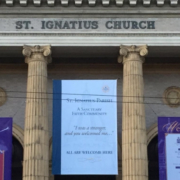Mealtime Ethics
BY ED SLOANE | August 29, 2022
Sunday’s Readings
For those of us who are students or educators, the end of August marks the return to school, which can be an occasion for anxiety, particularly when it comes to the lunchroom. There is a complex social dance concerning where and with whom to sit, which can be felt by students and teachers alike. Scenes that chart the politics of the lunchroom are a staple of teen films. Thinking about this politics is key for Christians.

Mealtime in the ancient Roman world, especially during the ritual meals of Roman social clubs, offered a microcosm of the social and class relations that governed the highly stratified world of the 1st Century. Christian meals broke down the social barriers and inverted the values that ordered Roman society, privileging humility and hospitality over status and wealth. Jesus is remembered as one who fed the hungry and gathered a diverse mixture of people together at table, and it is through the Eucharistic meal that Christ continues to make Christself known to us.
The parable we hear in today’s Gospel serves as a Eucharistic ethic, providing us some guidance as we navigate these social and mealtime politics. As Jesus explains, “When you hold a lunch or a dinner, do not invite your friends or your brothers or your relatives or your wealthy neighbors…Rather, when you hold a banquet, invite the poor, the crippled, the lame, the blind.”
As educators and students, how can practices of hospitality and humility both infuse our curriculum and inform our interactions with one another? We can begin with simple actions while at the same time working for systemic change. Practicing the pronunciation of names, using correct pronouns, listening to and learning from one another, making space at the table in the cafeteria for a new colleague or classmate are only a few examples of practices that can infuse our schools with a Eucharistic ethic. What are some more practices that you would suggest? What might liturgical communities and Eucharistic tables look like if we practiced Jesus’ mealtime ethics?
Ed Sloane is originally from West Virginia. He received his Ph.D. in religious education and pastoral ministry at the Boston College School of Theology and Ministry. His writing focuses on approaches to education in faith through the lens of ecological justice and pastoral ministry with LGBTQIA+ youth. Ed is also a high school theology teacher.










Jesus mealime ethics would include that quiet but radical hospitality He manifested. In the Alpha program at our Church we share a meal first so that we can get to know the people we will be in conversation with. After the meal and cleaning up we watch a video on one of the parables of Christ or the virtues he shows us. After the video we gather in small groups to talk about the video and the ways we can invite others to be part of the Gospel stories. The Eucharistic meal and subsequent conversation about how Jesus is part of our lives provides the grace to bring that celebration of the Gospels to all throughout the week. Dinner and Mass with our family also brings that sense of the Gospel values to our immediate family and all those they come in contact with. thus we celebrate the Eucharistic celebration with our family and friends and make the kingdom of God visivle on the earth.
Meal time ethics at the Golden Temple in Amritsar are truly uplifting. Round the clock thousands and thousands of devotees and visitors are fed by the temple authorities and their allies each and every day of the year. The hungry are welcomed and made to sit in line on long carpets, volunteers serving as stewards attend to each devotee, visitor, or guest – serving rice, chapati, vegetable, salad, curry sauce, pickle, fruit and dessert. They call it ‘Guru ka Langar’. And it is free of charge. Commensality and conviviality at its very best.
At the heart is respect, when everyone no matter what religion puts God first in their lives.
The hungry are fed and the homeless sweep their sleeping place on the pavement clean before leaving for work to collect rubbish that is recyclable.
Sadly in the predominantly Godless, egoistical West, few think of others or the greater good of society.